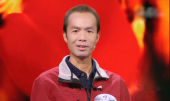题目内容
Rewrite the following sentences as required.
1.The headmaster noticed the teaching staff play with mobile phones at the meeting.(改为被动语态)
The teaching staff ________ noticed ________ play with mobile phones at the meeting.
2.The man of few words over there used to be our boss.(反义疑问句)
The man of few words over there used to be our boss, ________ ________?
3.Will they go to the orphanage or the old people’s home? They haven’t decided.(两句并一句)
They haven’t decided ________ they ________ go to the orphanage or the old people’s home.
4.Come back early this evening, or you won’t be able to watch your favourite live show on TV.(保持原句意思)
______ you ____ early this evening, you won’t be able to watch your favourite live show on TV.
5.Mrs. Church said to me, “I’m surprised that you progressed so rapidly.”(保持原句意思)
Mrs. Church didn’t ________ me ________ progress so rapidly.
6.It’s much fun to go cycling with some of my best friends at weekends.(改为感叹句)
________ ________ it is to go cycling with some of my best friends at weekends!
7.well, the manager, as, provide, and, to, delicious food, excellent service, promised(连词成句)
________________________________________________________________________
 名师点拨卷系列答案
名师点拨卷系列答案

